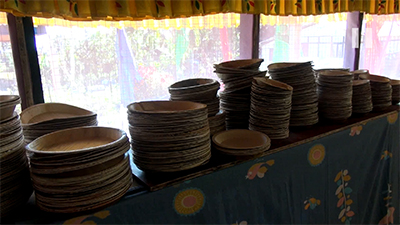 For many years, the areca nut has been one of the main sources of income for the people of Shariphu village under Senggey Gewog in Sarpang. But people will now be able to earn an extra income by making biodegradable plates using areca leaves. Tarayana Foundation installed the areca nut plate making unit for the community recently.
For many years, the areca nut has been one of the main sources of income for the people of Shariphu village under Senggey Gewog in Sarpang. But people will now be able to earn an extra income by making biodegradable plates using areca leaves. Tarayana Foundation installed the areca nut plate making unit for the community recently.
 While the plants’ commercial value mostly lies in its nut, what the farmers will now focus is on the sheaths attached to its leaves.
While the plants’ commercial value mostly lies in its nut, what the farmers will now focus is on the sheaths attached to its leaves.
The dried areca sheath is cleaned by scrubbing thoroughly using a soft brush to remove dust. After draining the water, the sheaths are then pressed in the machine. There are five different machines that can make different sizes of the plates.
The Shariphu Farmers’ Group with some fifteen members will manage and operate the unit.
“People here don’t have to travel to other districts for employment. They can stay back and make income through this. And secondly, it will help reduce malaria in the community. This is because the mosquitoes breed in the stagnant water collected in the areca nut leaves. And this increases the risk of malaria outbreak,” said Kesang Wangmo, a member of the group.
“Currently, we have a shortage of other machine parts. If we have access to the machine parts then the areca nut leaves won’t go to waste. We can make spoons. In addition, if we have a good market then women groups here can produce in a large scale and earn income.”
The Dzongkhag administration assured supporting the people in marketing the areca plates.
“Your market would be hotels. In coordination with the Tarayana officer here, we would arrange to market your products with the hoteliers. You can also now start partnering within the community during important ceremonies, events and celebrations to use local products,” said Lobzang Dorji, the Sarpang Dzongda.
One of the farmers from the village leased his land for free to set up the plate making unit worth Nu 700,000.
“We didn’t have to charge money for labor works. The people here contributed their labor voluntarily. Most of the cash was incurred on purchasing materials like boulders, cement, sand, electrical items, timber and transportation cost,” said Namgay, the field coordinator of the Tarayana Foundation.
The Tarayana Foundation has plans to procure additional equipment to make spoons and other products from the waste sheaths. Shariphu village has about 34 households.
Karma Wangdi, Sarpang
Edited by Sonam Pem












